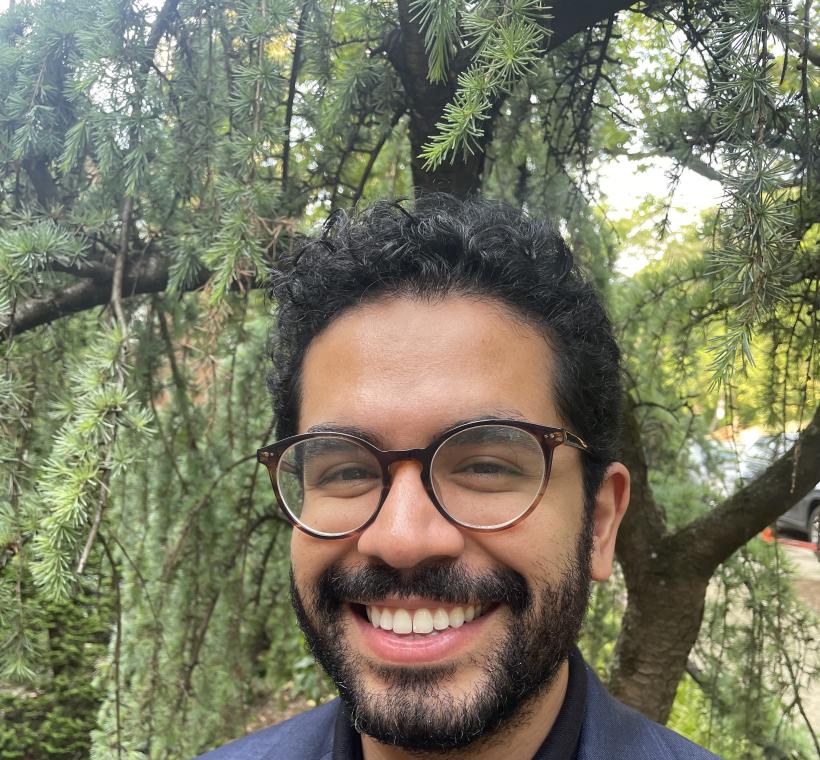
Héctor Alejandro Arzate
Tell us about yourself:
I am a Mexican-American writer and radio journalist who lives in Washington, D.C. Currently, I report for immigrant communities at the local public radio station, WAMU 88.5, and our digital website, DCist.com.
I love my job because I get to drive dozens of miles between D.C, Maryland, and Virginia to meet the countless people who contribute to the fabric of our everyday lives. Whether it’s stories about food, religion, health, politics, or the arts, I feel lucky to report on our region’s immigrant communities and vast diasporas. My recent reporting has appeared in PRX’s The World, NPR’s Here and Now, and the BBC World Service’s Newshour.
Before moving to D.C., I studied criminology at Cal Poly Humboldt. There, I got my start in journalism at my school's bilingual newspaper, El Leñador. I also produced newscasts for the student radio station, KRFH 105.1 FM. Way before that, I grew up in Richmond, California. When I am not working, I enjoy fly-fishing, cumbia, magical realism, and trying new dinner recipes.
A piece of yours or project (in any medium) that you'd like to share.
This summer, I co-hosted AeroEspacial – a limited podcast series by the Smithsonian’s National Air and Space Museum. It was published in both English and Spanish and featured a handful of stories that highlighted Latino history and culture at the heart of aviation and space. Our episodes ranged from Latino futurist art, representation in Star Wars, an observatory in Puerto Rico, and a program to fly thousands of unaccompanied children out of Cuba.
I’m very proud to have worked with my co-host, Sofia Soto-Sugar, and the rest of the mighty team at AirSpace to put together this project. I loved it so much that I reported a separate feature at WAMU 88.5 about the local Latinos working at NASA on research, space discoveries, and the latest mission to the moon.
If you’re interested, please tune in to WAMU.org on Friday, October 6 at 1:00pm ET (or you can stream afterwards!) for an hour-long special that we’re producing to showcase the limited series and some of my reporting from NASA!
What draws you to storytelling?
I come from a family of storytellers. As a kid, I remember sitting around the dinner table listening to my mom and others reflect on their day, share the latest chisme, reminisce on the past, or dream of the future. In many ways, it was like a daily ritual. We’d sit there with a little cup of coffee and some sweet bread and talk for hours.
Today, I understand how powerful it was for us to not just trade stories but listen to one another. That’s something I try not to take for granted whenever I’m out reporting and hearing from people in my community. I think being able to continue in this tradition, which has long existed for my people and so many others, is what draws me to storytelling.
What excites you the most about being a New Voices Scholar?
I love being part of a community of such talented and diverse people. So far, I have found that I’m not just learning from our coordinators, lecturers, or my own mentor, but also from my cohort. There is such a wealth of knowledge and desire to support one another – it’s really unlike anything else I’ve seen in the audio industry. I’m excited to continue collaborating with others and hopefully support future scholars in amplifying underrepresented voices.
What’s playing on your radio/audio streaming service right now?
I’m really digging Ten Thousand Things by KUOW, Foretold by the Los Angeles Times, and Port of Entry by KPBS. It’s so exciting to be taken on these audio journeys to meet such interesting people and hear such rich stories. I’m very into this style of storytelling and I hope I can one day pitch something similar. I also enjoy Not Another D&D Podcast for whenever I’m cooking and cleaning!
What’s the most underrated tool (technical or not) that you use in your creative process?
The voice memos app on my cell phone! It’s come in handy the few times that I had dead batteries, no more storage on an SD card, or downright didn’t have a Zoom kit with me. In a jiff, I think the audio is actually pretty solid for interviews or even tracking yourself if you had to. It’s also easy to email, slack, or send wherever it's needed.
What is something you want to see more of in the industry?
As someone who works in public radio, I believe strongly that we need to make sure our programming is reflective of our communities. That means highlighting voices that are underrepresented and flat-out unheard on air. Personally, it’s my goal to share more voices with accents and those that speak a language other than English. I think it’s a really practical way of breaking the stereotype of what public radio sounds like.
Who/What are your radio/audio inspirations and why?
I’m deeply inspired by my former colleagues Ruth Tam and Patrick Fort, the co-hosts of Dish City – a hyperlocal podcast series about food, culture, and people in the D.C. region. I think their reporting and producing is some of the best on the subject and proof that you don’t need to go big and national to produce a fantastic podcast. Not to mention that they won a James Beard award!